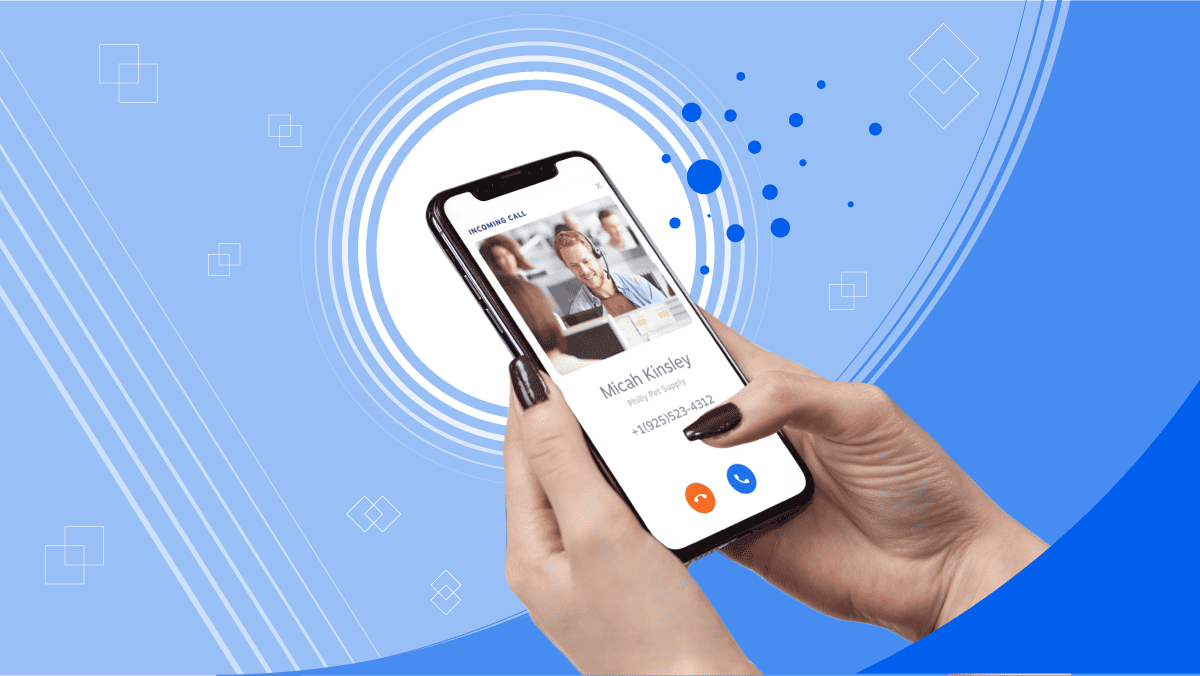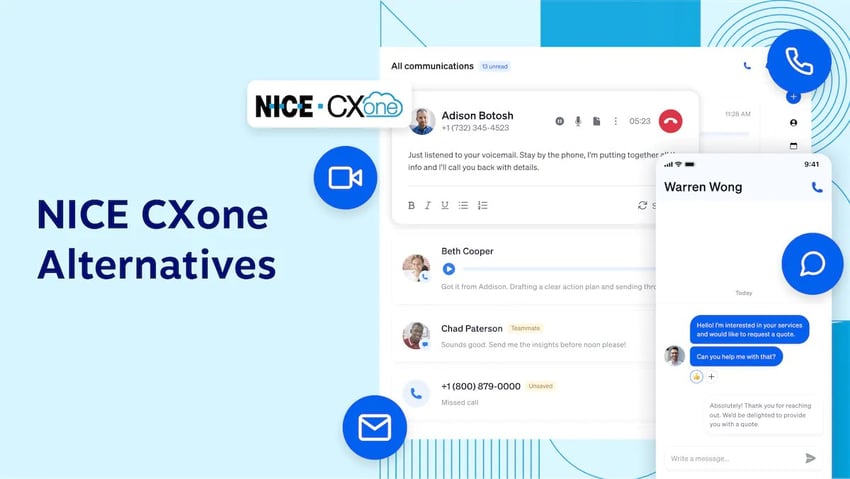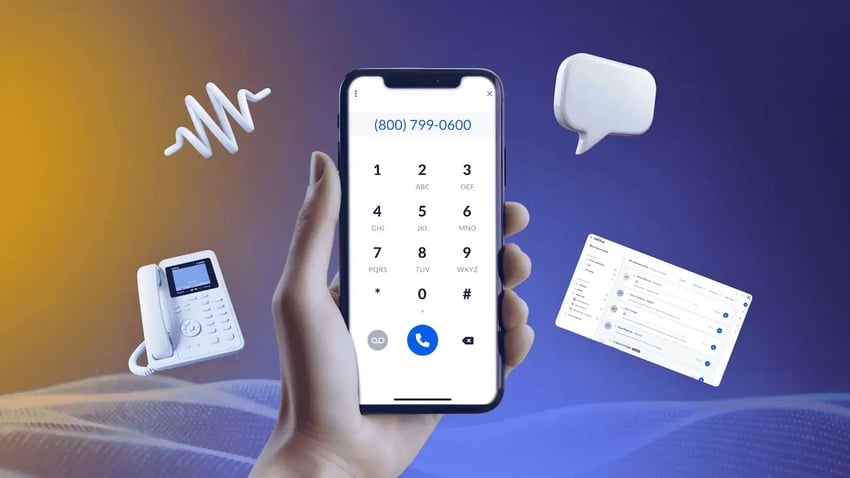What Is a VoIP Phone?
A VoIP phone is a phone that uses an internet connection to make and receive calls instead of traditional landlines.
VoIP phones give you greater mobility, interoperability, and connectivity. Many modern VoIP phones feature a user interface similar to that of a smartphone, making them intuitive and easy to use for most users.
The best part? You’re not restricted to a specific location. You can use an app to make phone calls from any desktop computer or mobile device.
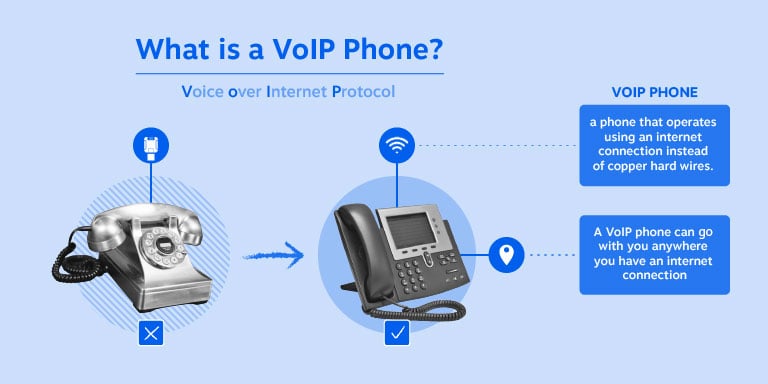
VoIP vs. Traditional Phone Systems
The biggest difference between a VoIP phone and a traditional landline telephone is that a VoIP phone is connected over the internet. In contrast, a landline phone is installed in a physical location by the local telephone provider.
On the other hand, a VoIP phone makes and receives calls over the internet and is not limited to a specific location or provider. VoIP phones enable more flexible and efficient business communications compared to traditional systems.
This way, you can use that phone number from anywhere you have internet access.

As a result, there are two significant differences in functionality between VoIP phones and traditional phones. The first is that a VoIP phone will work in any location. As long as you have an internet connection, you’ll be able to make and receive calls without being tied to one place. VoIP technology supports integrated communication tools, including voice, video, and chat, which enable seamless and reliable business communications.
Start calling for just $15/mo.
See why over 100,000 businesses switched to Nextiva. Now you can get it all for $15/month per user.
And the second difference is that you don’t need a physical phone to make calls. You can make a call using an app on your computer or mobile phone.
Here’s a detailed comparison between VoIP and landline phones.
| Functionality | VoIP phones | Landline phones |
|---|---|---|
| Phone calls (PSTN) | Yes | Yes |
| Nationwide long-distance | Included | Optional |
| User-to-user calls | Yes | PBX required |
| Caller ID | Yes | Yes |
| Call waiting | Yes | Yes |
| Ease of setup | ★★★★★ | ★★★ |
| Requires internet | Yes, 100 Kbps per line | No |
| Wireless | Wi-Fi, DECT, and Bluetooth headsets are available | DECT and Bluetooth headsets are available |
| Reliability in internet/power outages | Calls can be routed to another number or voicemail. | Calls drop or are routed to voicemail. |
| Technology | IP telephony (SIP, TLS, and SRTP) HD audio quality | Analog voice signals |
| Call quality | ★★★★★ | ★★★★ |
| Setup cost | $0 | $110 per jack |
| Monthly cost | $20–40 | $50 |
| Activation fee | $0 | $50 |
| Auto attendant | Included | PBX required |
| Phone number privacy | Included | Varies |
| Phone number changes | Included | $27 |
| Hunt groups | Included | PBX required |
| Conferencing | Included | Three-Way Calling |
| Call routing | Included | $9.95/mo |
| Call queuing | Add-on | Add-on |
| Remote work compatible | Yes, softphone apps | Call forwarding |
| Call encryption | Yes (TLS & SRTP) | No |
| International dialing | MX: $0.16/min UK: $0.01/min JP: $0.05/min | MX: $0.54/min UK: $1.21/min JP: $1.62/min |
| Business voicemail | Included | $13.95/mo |
| Integrations (CRM, text messaging, surveys) | Yes | No |
Related: What is SIP Trunking? How it Works, Benefits & How to Get It
How Does a VoIP Phone Work?
A VoIP phone operates by using digital signals to authenticate and establish phone calls. VoIP phones associate themselves with a VoIP service provider. The process entails the following steps:
- A VoIP phone “registers” itself with a VoIP phone service provider.
- The VoIP provider sets up and manages incoming and outbound calls.
- When a call is placed from a VoIP phone, the provider sets the call up over the public switched telephone network (PSTN).
- When a user talks on a VoIP phone, the handset converts and compresses the sound into data packets and sends them instantly to the VoIP provider.
- Depending on the other party’s phone provider, the provider relays the data packets or converts the sounds back into analog audio.
All these steps take less than a few seconds to establish a call, but the conversation happens in real time without delay once it’s connected. Want to know about the technology behind VoIP? Check out our beginner’s guide to SIP.
So, Why VoIP Phones?
Historically, the local phone company had to connect each phone number to a phone handset. A technician had to run a physical line from a neighborhood terminal to your building and wire up the telephone network interface.
In the 1990s, businesses sought to manage phone features independently, particularly with the rise of call centers as a business function. So they managed the phones in the office using specialized equipment known as a Private Branch Exchange (PBX). One of the PBX limitations was that operators still needed to purchase lines and numbers from the phone company.
Less than a decade later, today’s phone system began to take shape.
Communication providers like Nextiva became the industry standard for business phone systems. Instead of purchasing expensive telephone equipment with proprietary phones, the industry evolved to provide reliable phone service using interoperable equipment to connect to the PSTN
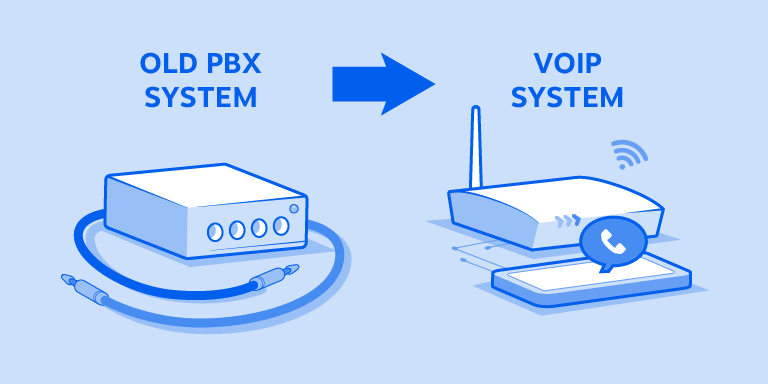
Today’s VoIP phone features offer many more features and higher reliability than those available on old PBX systems.
Since VoIP phones work by handling telephone calls from the internet, or the cloud, the technology employs existing computer network cabling or Wi-Fi to access telephone networks.
Now, with modern technology, VoIP phones work by converting analog voice signals into digital signals over your broadband internet connection. The easy way to say it? VoIP uses the internet to make and receive calls rather than traditional landlines.
All you need is an internet connection and a business VoIP provider to place and connect the calls.
Check out how Tony breaks it down in this video.

VoIP technology uses existing computer network cabling or Wi-Fi to access telephone networks.
No more wires or boxes are needed to use your VoIP business phone service! Now you can take a call from anywhere you have internet — even from an app on your computer — and your phone number can stay the same as before, so you won’t have to change it. Additionally, VoIP phones support Bluetooth connectivity, allowing users to connect wireless headsets and devices for added convenience.
So whichever telephone device your company chooses, you can connect it to the VoIP phone system easily. Just plug the phones in and have your tech team configure the system to suit your particular needs best.
Sometimes, businesses prefer to retrofit an existing PBX to a cloud-based system rather than switching entirely to a VoIP phone system. This type of migration would rely on Session Internet Protocol, known as SIP trunking, to connect phone calls over IP networks. Session Initiation Protocol (SIP) is commonly used as a control protocol in VoIP technology, ensuring efficient call management and connectivity.
Related: What Is VoIP? The Newbie’s Guide to Voice over IP
Benefits of VoIP Phone Systems
VoIP phone systems offer many benefits, but the most popular reason why they’re popular is that you can make and receive phone calls from any high-speed internet connection. No more being tethered to a desk to work. You now have virtual phone numbers to protect your privacy. Use Nextiva’s business phone app to receive calls from your desktop computer or any mobile-compatible device with our mobile app.
Businesses like VoIP because it’s easier to scale (vs. traditional landlines) and add phone numbers as your team grows. Why? Because you don’t need technicians to come out to install physical phone lines. VoIP has easy installation — you only need an existing broadband connection and a VoIP provider.
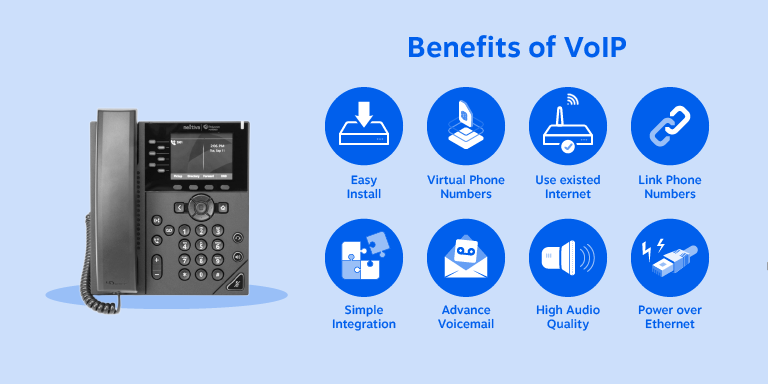
Other popular VoIP features for business include integration with existing software applications, like Microsoft Teams integrations. For example, VoIP phones integrate with software applications, such as Microsoft Teams, for a unified communication experience. Advanced voicemail features like visual voicemail and voicemail transcriptions are also sent to your email.
Lots of businesses like the low-cost approach to maintenance. Not only do you not need your own PBX or server since the data is hosted and managed by your VoIP provider, but you will get automatic software updates, so no one needs to monitor your phone system.
VoIP phones provide high-definition sound quality (twice that of traditional landlines). This enhanced audio clarity ensures better communication experiences for users. And your VoIP phone system can be set up for Power over Ethernet (PoE). That feature means they have power over their Ethernet network cable instead of relying on a traditional power adapter. This results in fewer plugs that can get knocked out of power strips around the office.
VoIP Phone Equipment
There are two main types of VoIP phones: wired phones and softphones.
You may need only one type to suit your needs, or your business may operate best when you combine a few different types. Many VoIP phones feature customizable keys for quick access to frequently used functions or contacts, making them highly adaptable to individual or business needs.
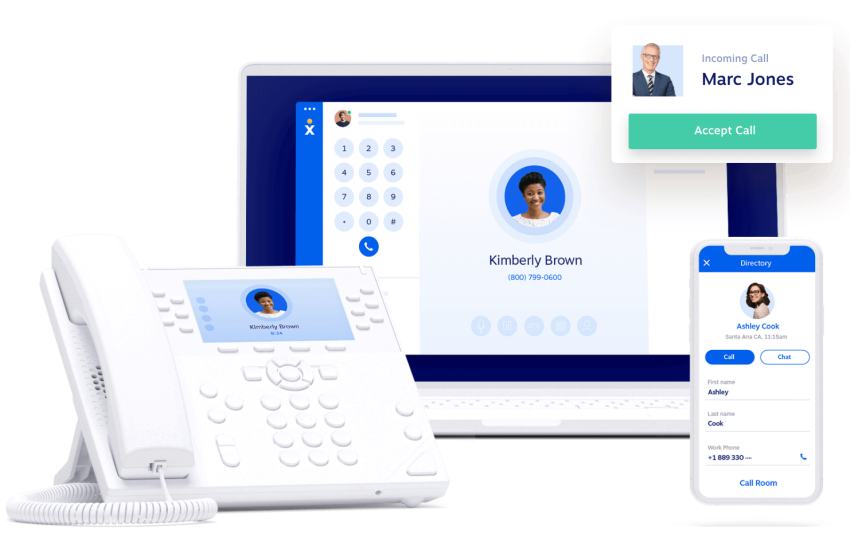
VoIP hard phones are physical phones that you can see, touch, and feel. On the other hand, softphones are basically apps you use on a computer or mobile device to accept and make calls.
If you choose Nextiva for your cloud phone system, you will get a softphone included in your package. Nextiva also offers a variety of certified VoIP phones and equipment guaranteed to work for your needs.
Nextiva has assembled a chart showing the most popular VoIP phones on the market to make the decision process easy. All of these models have been tested and reviewed, and each has been benchmarked to the highest industry standards.
Remember that countless other models are available (some with either more advanced features or additional lines). Here’s a more comprehensive list of the best business VoIP phones.
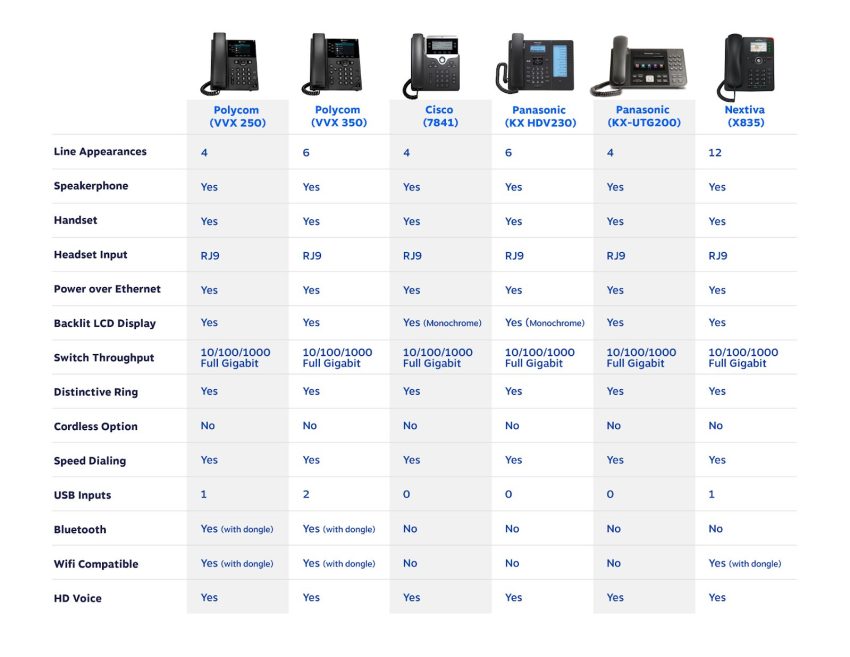
Best Picks for VoIP Phones
- Poly VVX 250: A high-quality, four-line, IP phone ideal for knowledge workers who need to meet today’s modern business environment demands and the ability to multitask or handle multiple calls.
Pricing: $160 - Nextiva X-885: A sleek, twelve-line, color, IP phone ideal for executives and receptionists. It has a multi-page approach to provide twelve additional programmable keys.
Pricing: $190 - Yealink T57W: Designed for busy executives and professionals, the Yealink T57W is an easy-to-use business phone with an adjustable 7-inch touch screen. With integrated Bluetooth 4.2 and dual-band 2.4G/5G Wi-Fi, the T57W IP Phone allows for multiple wireless connection options.
Pricing: $310

A conference phone differs from a desktop phone in that it is optimized for broadcasting high-quality sound in a group setting like a conference room because it has an omnidirectional microphone configuration.
However, there isn’t a big functional difference between desktop and conference phones. You can easily use the other if you learn how to use one.
The models shown below are among the most popular VoIP phones in the market. Each comes with standard features like speakerphones and speed dialing. For information on additional features and capabilities, refer to the chart below.
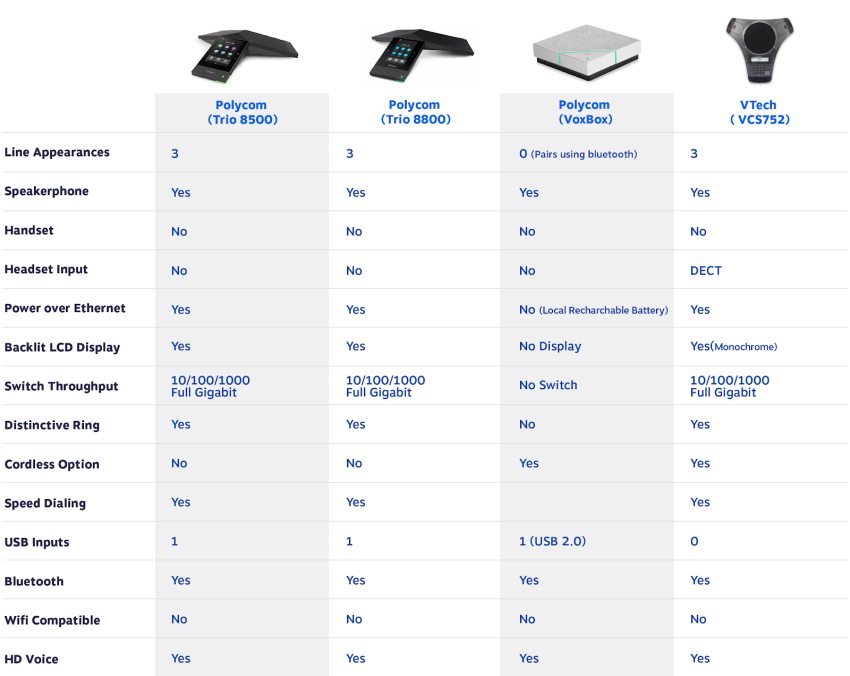
Best Picks for VoIP Conference Phones
- Snom C520: A high-quality conference phone with 2 additional rechargeable wireless microphones to extend the vocal range and built-in noise reduction that is ideal for any conference room.
Pricing: $389 - Poly Trio 8500: A powerful conference phone with a color LCD touch screen, 14-foot optimal vocal pickup range, plus USB and Bluetooth connectivity. The Poly Trio 8500 is ideal for medium and large conference rooms.
Pricing: $740 - Poly Trio 8800: A powerful conference phone with a color LCD touch screen, a 20-foot optimal vocal pickup range, Wi-Fi, USB, and Bluetooth connectivity. The Poly Trio 8800 is ideal for large and extra-large conference rooms.
Pricing: $900
What Type of VoIP Phone Does My Business Need?
In the end, you cannot go wrong with any of these popular devices. You’ll notice that each offers the features you would expect from a phone system.
Here are the primary requirements to consider before choosing a device:
Consider the brand reputation.
Are there names you trust more than others? Think about longevity and past performance.
- Poly is the global leader in effective business communication with colleagues, partners, customers, and prospects. You can’t look at a serious VoIP solution without including its product line in your decision-making process.
- Cisco is a prominent name in business networks and internet infrastructure, and a leading player in the VoIP hardware market.
- Panasonic is one of the world’s leading innovators in VoIP phone business systems. Their reputation for producing high-quality electronic devices dates back decades.
- VTech is the world’s largest manufacturer of cordless phones and is well known for its electronic educational toys.
Check the number of line registrations.
How many lines does each VoIP phone in your office need to handle? Some team members will need many more than two lines. Likewise, look at how many line appearances you can see on the screen so you know if another user’s line is available.
Do you use headsets?
What type of connectors do they have? An RJ-9 is a familiar type of connector for telephones but is less popular. Today’s headsets use USB for connectivity. If you need Bluetooth, then make sure your device supports it. Some devices require a USB-to-Bluetooth dongle that might not be included.
Ready for Power over Ethernet (PoE)?
Most Voice over IP phones now support PoE, but ensure you have the power adapters, since most employees working from home do not have PoE-capable network equipment. Cloud VoIP services simplify management, enabling faster onboarding and easier user management, which is especially beneficial for remote or hybrid work setups.
Don’t forget about reliability.
Does the phone receive regular security updates? VoIP phones that receive these updates tend to be more reliable than devices that need firmware delivered by hand. (Hint: Many, many internet-connected devices never get updated.)

Frequently Asked Questions About VoIP Phones
Got questions about VoIP? Don’t worry. You’re not alone. Here are our answers to the most frequently asked questions about VoIP phones.
Yes, you can transfer phone numbers from your current or even previous phone service. With Nextiva, you can transfer your phone numbers to our VoIP phone service through a straightforward number porting process.
Provide your current business phone number and account details, and we’ll handle the rest, coordinating directly with your previous carrier. We recommend keeping your old service active until the transfer completes to avoid any disruption. This ensures your contacts keep reaching you without any interruptions. For more details, see our guide on how to port your number to VoIP.
Yes, VoIP can support business SMS texting, allowing you to send and receive text messages directly from your desktop and mobile apps. This integrated texting capability helps you communicate efficiently with customers and colleagues, all within one platform like Nextiva. However, you must also register your numbers to send text messages using a process known as 10DLC.
Nextiva also supports multimedia messages for pictures, audio, and video. If you want to text from your desk phone or app, Nextiva makes it easy. Learn more about texting with VoIP.
Yes. Most VoIP desk phones use standard protocols like SIP, so you can switch your VoIP provider without replacing your physical phones, as long as the new provider supports your device. Changing providers involves updating your phone’s configuration with new credentials, giving you the flexibility to choose the best service and features for your business without extra hardware costs.
Check out our article on tips for selecting a VoIP provider for more guidance.
Setting up a VoIP phone system is easy. First, ensure you have a reliable high-speed internet connection. Then, choose a Nextiva plan that fits your business needs and sign up. Connect your VoIP phones to your network or install Nextiva’s softphone app on your computer or mobile device. Use our intuitive web portal or mobile app to configure call routing, voicemail, and other features.
Our expert support team is available to guide you through setup and ensure your system runs smoothly.
VoIP phones with Nextiva deliver significant advantages: lower costs on long-distance and international calls, complete mobility to make and receive calls anywhere with internet, and advanced features like voicemail-to-email, video conferencing, call forwarding, and integrations with your email or CRM software. The call quality is sharper and truly is in high definition so that everyone can hear you clearly.
Our cloud-based system scales effortlessly as your business grows, eliminating costly hardware upgrades. The primary consideration is ensuring a stable internet connection for optimal call quality.
With Nextiva’s network reliability and optional backup solutions, disruptions are minimal. Security is robust, with encrypted calls and continuous monitoring to protect your communications.
No. With Nextiva, you can use physical VoIP desk phones or one of the best VoIP apps available for your desktop or mobile devices. These VoIP-specific apps, also called softphones, enable you to make and receive calls using your computer or smartphone without requiring additional hardware.
However, many businesses prefer dedicated VoIP phones for their ease of use, dedicated features, and professional appearance.
Practically speaking, no. To connect calls to the public switched telephone network (PSTN) and manage phone numbers, you need a VoIP service provider like Nextiva.
While it is technically possible to run your own VoIP server, as is the case with 3CX, it requires significant technical expertise and infrastructure. Nextiva’s fully managed service handles call routing, number management, security, and support, providing a reliable and hassle-free experience.
But if you want to set up your own PBX, you can — but be sure to connect it to a top-rated SIP trunk provider like Nextiva.
VoIP phone systems are designed with security, especially if they run on Nextiva. We use industry-standard encryption protocols like TLS and SRTP to secure your calls and data. Our platform employs firewalls, secure authentication, and continuous monitoring to prevent unauthorized access and cyber threats. We also provide regular software updates and security best practices to keep your communications safe.
Choosing Nextiva means selecting a trusted provider dedicated to safeguarding your business communications. Learn more about VoIP security.
Growth Starts With Reliable Communications
A phone call is behind every sale, team meeting, and customer service interaction. You need a flexible VoIP phone system that propels your business further. As you grow, easily set up features like call centers and the like.
There are many choices when buying and configuring your business VoIP service. Making sure you have the best VoIP provider, phones, and features gives you more confidence to run your business.
Start calling for just $15/mo.
See why over 100,000 businesses switched to Nextiva. Now you can get it all for $15/month per user.
The good news is that you are not alone in this journey, and there are professionals to guide you along the way. Talk to a Nextiva VoIP specialist who can help you select the perfect phone system for your company.
Setting up a VoIP phone takes minutes after signing up, setting up call flows, and placing business calls. You can choose pre-configured VoIP phones or download an app to make calls from your company.


















 VoIP
VoIP 
